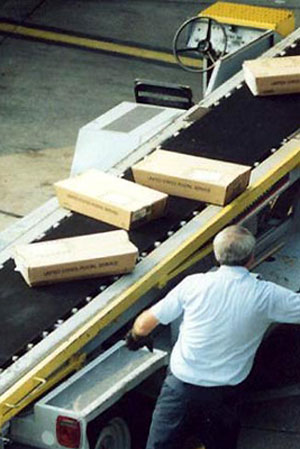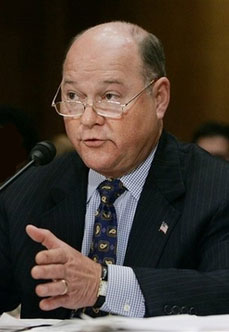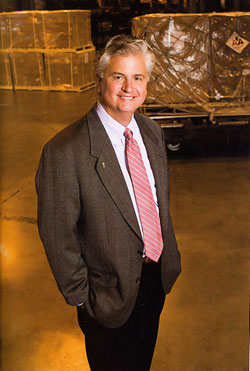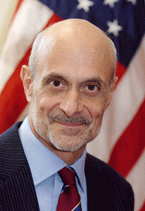USA Cargo Security Slammed
  Homeland
Security Inspector General Richard Skinner, a career U.S. government audit
officer made public a report yesterday (Thursday September 6) saying that
the TSA (air cargo) system "increases the opportunities (to put)
explosives, incendiaries and other dangerous devices on passenger aircraft." Homeland
Security Inspector General Richard Skinner, a career U.S. government audit
officer made public a report yesterday (Thursday September 6) saying that
the TSA (air cargo) system "increases the opportunities (to put)
explosives, incendiaries and other dangerous devices on passenger aircraft."
It seems like every year since 9/11, the
run up to that terrible day in America includes press reports of some
new impending security problem.
This year in America the subject is air
cargo.
USA Today, the top national newspaper
in America on Friday September 7 ran a lead front-page story above the
fold with the headline:
“Report Blasts TSA Air Cargo Security.”
“The Transportation Security Administration's
program for keeping bombs out of airplane cargo holds is riddled with
holes that leave passenger planes vulnerable to attack, a government investigation
shows,” USA Today trumpeted.
“TSA has too few cargo inspectors,
an ineffective database to track violations and vague regulations for
screening cargo being put on passenger planes, the Homeland Security Department
inspector general said in a report released Thursday,” the story
continued.
"The report is a blistering, scalding
indictment of TSA," said Rep. Ed Markey, D-Mass.
So if the headline mentioning blast didn’t
get your attention, alongside the story USA Today ran a graph
counting up a daily air cargo throughput in USA of 7,500 tons of cargo
kept in storage areas, and “moved under passenger cabins that also
hold luggage.”
“Airlines typically lease a portion
of their cargo holds to freight companies, and last year earned $4.4 billion
from cargo operations, according to the Air Transport Association, an
airline trade group,” USA Today said.
Finally more than half way through the story
we learn that the Homeland Security Inspector General’s report is
actually nothing new, and in fact had been circulated to many government
leaders, industry and other interested parties as early as May 2007, nearly
five months ago.
But for some strange reason the HS IG report
was not released to the public until six days before the sixth anniversary
of 9/11.
For his part, Dave Brooks, President of
American Airlines Cargo Division is having none of it.
 “This
(USA Today) story is typical of the sloppy and hysterical retail
reporting of air cargo issues that has unnecessarily prolonged the
debate over what rational air cargo programs should look like. “This
(USA Today) story is typical of the sloppy and hysterical retail
reporting of air cargo issues that has unnecessarily prolonged the
debate over what rational air cargo programs should look like.
“"Report Blasts Air Cargo
Security" – on the front page??—Come on—the
level of cargo screening on passenger aircraft has never been higher.
“TSA inspectors are everywhere,
every day, in cargo facilities, forwarders’ warehouses, on
the ramps, even checking shippers.
“Non-compliers are shuttered.
“I haven’t read the report,
and the TSA can speak for itself, but I understand it’s (the
USA Today story) based on old data and significant improvement has
been made since.
“Why is there never any ink
on why the security rules are different for cargo aircraft?
“Or for trucks?
“Or trains?
“Or boats?
“But you can’t blame the
media for the recent, utterly incredulous comments made by Congressman
Markey, and the subsequent spin-off editorials and pontificating
that the TSA is trying to pull a fast one with a Certified Shipper
Program, a concept provided for in the law that Markey was in the
room helping to write, and that hasn’t even been developed
yet.
“This is THE ONLY part of the
9/11 legislation on cargo security that made any sense—apply
multi-layered screening where it is most efficient and effective
in the supply chain.”
|
As we go to press, response
to the USA Today story from readers on the newspaper’s
own website ranges from resignation to President Bush Iraq War bashing,
with few informed opinions and more than a little consternation at the
prospect of unscreened cargo riding below deck.
For the record, TSA told USA Today
that it agreed with the inspector general's conclusions and said it has
made improvements since the report's findings (that were as mentioned
released and circulated privately in May).
 The
response of Rep. Markey is predictable. The
response of Rep. Markey is predictable.
The Massachusetts politician who signed
off on that landmark Homeland Security Bill less that two months ago calling
it a great start, has also built a national political career slamming
airline and airport security for some time now.
"They were legitimate criticisms,"
said John Sammon, a TSA assistant administrator.
"Things are not the same today as they
were back then," Sammon added.
To whatever extent popular media extends
an image of an air cargo industry where not enough is being done about
security concerns more than a few transportation people.
 Sources
acknowledge that charges of air cargo security shortfall carry an onerous
weight as anything seems possible post 9/11, but the effort to clamp down
on air cargo security remains at highest priority. Sources
acknowledge that charges of air cargo security shortfall carry an onerous
weight as anything seems possible post 9/11, but the effort to clamp down
on air cargo security remains at highest priority.
Yesterday in testimony that USA Today completely
overlooked in their article, Secretary Michael Chertoff before the House
Committee on Homeland Security reassured lawmakers and the shipping and
traveling public saying:
“Our concern about passenger planes
is not limited to the problem of dangerous people boarding them.
“We are also focused on the risk of
dangerous cargo entering them.
“Last year, we issued a new air cargo
regulation that mandates 100% inspection of passenger parcels that are
presented at airport counters.
“We also put in place stricter inspection
requirements for air cargo shippers and indirect carriers.
“In the next fiscal year, we plan
to invest $56 million to fund 300 air cargo inspectors, K9 teams and technology
which will allow us to track carriers, shippers, and support risk-based
air cargo screening across the entire supply chain.”
Also of more than casual interest will be
a report from that widely publicized
Air Cargo Explosives Detection Pilot Program
that TSA spent more than $30 million on last year at this time.
The pilot program at SFO and two other USA
air cargo gateways was mounted to understand better the technological
and operational issues associated with explosives detection for air cargo
by testing equipment while developing concepts of operations for screening
air cargo.
Geoffrey
|



